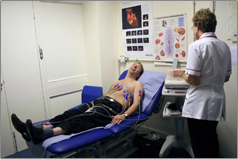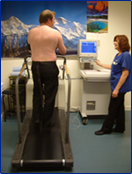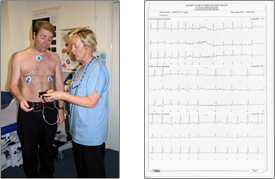Cardiac Procedures
ECG
What is it?
An ECG records the electrical activity which drives the heart and instructs the heart muscle to beat. It records the regularity i.e. rhythm of the heart. It is a simple test which provides a lot of valuable information.
The Technique
The electrical out put of the heart is recorded by small electrodes, which are 'sticky patches', which are applied to the arms, legs and chest. They are connected to a recording machine which picks up the electrical signals that make the heart beat. A few beats from each set of electrodes is recorded onto paper and takes only takes a few minutes.

The Information
The recordings will show the rhythm of the heart, if someone is having a heart attack or if they have had one in the past. It may also show if the heart is working under strain or indicate if the heart is enlarged or thickened.
Exercise ECG
Exercise Stress Test or Exercise Tolerance Test - ETT
ETT's record your ECG while you are walking on a treadmill or riding an exercise bike. This test examines how the ECG responds to exercise.
Pre Test Preparation
A heavy meal a few hours before the test is best avoided. Wear light, comfortable clothes and shoes. Your doctor may advise you to omit heart medications for one or two days before the test as these may influence the results. For example, beta blockers slow the heart rate and limit the response to exercise. This will affect the interpretation of the Exercise ECG.
The Test
The electrical output of the heart is recorded by small electrodes, which are 'sticky patches' that are applied to the chest. They are connected to an exercise recording machine. You will be required to walk on a motorised belt i.e. exercise treadmill. The treadmill gradually increases in incline and speed, every three minutes.
The ECG is recorded at intervals throughout the test and monitored by your technician and or doctor. You will be asked to inform the staff if you have any symptoms such as chest pain or discomfort or if you get very tired or short of breath. The test usually lasts from a few minutes up to 15 minutes.

Test Results
During exercise the heart requires more blood and oxygen. If the flow is limited by deposits of cholesterol which restricts the blood flow, the exercise ECG may show if your heart is not getting enough blood. This gives your doctor an indication of the severity of coronary heart disease if present. It is also helpful for looking at how well the heart is working after angioplasty/stenting or coronary artery bypass surgery.
24 Hour ECG
(Other names include Holtor Monitoring or Ambulatory ECG).
This test records every ECG heartbeat for 24 hours or longer if thought to be relevant by your doctor.
Electrodes are taped on the chest and connected to wires leading to a small portable digital recorder which is worn on a belt around the waist.

The results depend on the rhythm of the heart during the time the recorder is worn. Extra heart beats called 'extra systoles' are the most frequent finding and in most cases are of no concern. Sustained palpitations will only be recorded if you have a palpitation whilst wearing the recorder. It can also reassure if the results are normal.
Cardiac ECG Loop Recorder
If the symptoms are infrequent your doctor may suggest using a cardiac event/loop recorder which can record the heart's activity at the time you experience your symptoms whenever they might occur. You will normally wear this type of recorder for a few weeks. There are different types of event recorders where you can press a button at the time of your palpitations. There is also a device called a Reveal recorder which is implanted under the skin and can record your heart rhythm over a year or more.

